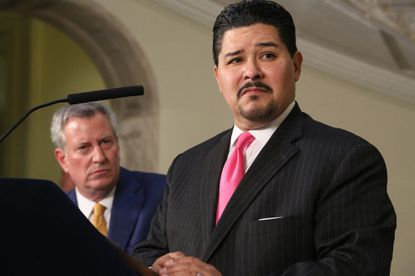By Oscar Mata
Lately, New York City high schools—public community schools and specialized “magnet” schools in particular—have been in a constant state of turbulence. There have also been numerous cases of people arguing that New York’s specialized high school test was ethnically unbalanced, giving certain students, specifically Asian and White students an advantage over others. Because of this, the DOE has been trying to change the administration process for these schools; although nothing has been passed thus far. But recently, New York City school chancellor Richard Carranza attempted to put his own plan in motion, one that could have negatively impacted some of the city’s top-performing high schools.
Carranza has argued in the past that screening entrants to public schools is “antithetical to what I think we all want for our kids.” However, it wasn’t until this past week that he acted upon his words. On February 13th, Chancellor Carranza tried to implement a policy that would un-screen some of the city’s best schools including Eleanor Rooselvelt High School, and Manhattan Center For Science and Mathematics.
Carranza tried to make this change quietly, waiting until now to reveal it, Including the day it would be implemented, which was March 1st. This was done to try to eliminate any opposition that he might face in passing the policy, since a large portion of this month (February) would be taken up by Midwinter Recess. Luckily, Principal Jimenez of Manhattan Center caught wind of the operation, and shared it with a outraged student body.
Why Was The New Policy So Detrimental?
Manhattan Center was created to be a top math and science high school for minorities during a time in which non-white and ESL students were underrepresented at several other top ranking schools that prepare students for college. While lower minority enrollment at other top high schools remains a problem today, MCSM currently has a student population that is 95% minority, along with a 98% graduation rate and a 90% college-acceptance rate. A large reason why this is the case is because MCSM screens its students based on their attendance records, and their math scores on the state exam. Chancellor Carranza took it upon himself to forcibly eliminate these admissions criteria at a top East Harlem school, supposedly in the name of ethnic equality.
If the new policy is adopted, an estimated 75% of new students entering MCSM in any given year would be left un-screened. This would reward students who don’t meet MCSM’s academic criteria, while undermining those who do meet these standards because they worked hard during middle school. Furthermore, if Manhattan Center began admitting a greater percentage of students who aren’t prepared for the demanding curriculum offered by MCSM, teachers might be forced to reduce the quality of existing classes, thereby hurting those who already meet the school’s criteria.
One worry for a school like MCSM is that if it were forced to abandon its screening process, the school might see significant funding being transferred to maintaining student discipline and safety instead of continuing to support the SAT prep courses and AP classes which help Manhattan Center students achieve their college dreams.
If Carranza’s plan were adopted, many of the city’s top minority students would no longer be able to receive the quality education now available at MCSM. Instead, that privilege might be limited to students able to pay to attend private schools. If a majority of future students entering MCSM turn out to be unmotivated, or simply uninterested in academics, this would demolish MCSM’s reputation as a top institution, and make the school just another of the many in the middle of East Harlem.
While Carranza is right to create more opportunities for minority students in NYC, taking opportunities away from the same students who deserve them is paradoxical. Instead, Carranza should focus more on funding the many underfunded public schools in locations like East Harlem that serve minorities. Rather than destroying the few high-caliber institutions already serving minorities, try to create more.
Thankfully, before this policy could be finalized, the shouts of students from MCSM were heard by the chancellor, and their opinions were taken seriously. The day after Principal Jimenez made the policy known, Carranza announced that he would reconsider the policy. It is thanks to the efforts of all Manhattan Center students, along with guidance from their student council, that MCSM has, for now, been able to maintain its screened status.
